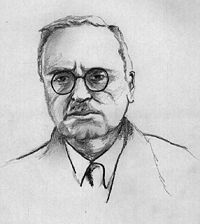Alfred Adler
| Part of a series of articles on Psychoanalysis | |

| |
|
Constructs Important Figures Schools of Thought | |
Alfred Adler (February 7, 1870 – May 28, 1937) was an Austrian medical doctor and psychologist, founder of the school of individual psychology. He examined human development in the context of the whole—how the person exists and interacts within the family, society, nation, and the world. He defined mental health as a feeling of human connectedness, and a willingness to develop oneself fully and contribute to the welfare of others. Adler's popularity can be attributed partly to his optimistic view of human nature, and partly to the fact that his theory makes sense to the general public, e.g. his ideas of "inferiority complex" and striving for perfection resonate with many people.
Life
Born in Penzig, a suburb of Vienna, Austria in 1870 and raised in Vienna, Alfred Adler was the third child of a Jewish grain merchant and his wife. Childhood illnesses and the traumatic death of a younger sibling influenced Adler's decision to pursue a medical career. He trained as a doctor at the University of Vienna Medical School and qualified in 1895. There he met his wife Raissa Timofeyewna Epstein, an intellectual and social activist from Russia. In 1897, they were married and later parented four children, two of whom became psychiatrists.
In his early career, Adler became interested in psychology as it related to physical disorders. In 1899, he met Sigmund Freud and they formed the Vienna Psychoanalytic Society with Adler as president. This close association was short-lived as Adler became a vocal opponent to many of Freud's theories.
Adler was a frequent lecturer in Europe and the United States, communicating with his audience as easily in English as in his native German. He became a visiting professor at Columbia University in 1927. In 1932, after most of his Austrian clinics were closed due to his Jewish heritage, Adler left Austria for a professorship at the Long Island College of Medicine. His sudden death from a heart attack in 1937 during a lecture tour in Aberdeen, Scotland, was a shock to the academic community and a blow to the influence of his work. Fortunately, however, a number of his ideas were taken up by neo-Freudians.
Work
Adler was a pioneer in creating a holistic view of human psychology. He called his approach "individual psychology," where "individual" literally means "un-divided."
Adler viewed human development within the whole social context. He defined mental health as a feeling of human connectedness, and a willingness to develop oneself fully and contribute to the welfare of others. When these qualities are underdeveloped, an individual experiences feelings of inferiority, or an attitude of superiority which may antagonize others. The perception of superiority leads to self-centered behavior and the individual may become emotionally or materially exploitative of other people. When the feelings of connectedness and the willingness to contribute are stronger, a feeling of equality emerges, and the individual will become more public-minded, self-transcending, and behave more beneficially to others.
Adler and Freud
Although Adler and Freud worked together in the Vienna Psychoanalytic Society for several years, Adler's ideas were very different, and even contradictory, to those of Freud. Adler contended with Freud's belief in the dominance of the sex instinct as the root of neurosis, and whether ego drives were libidinal; he also attacked Freud's ideas over repression. Adler believed that feelings of helplessness during childhood can lead to an inferiority complex. Many neurotic symptoms, he stated, could be traced to overcompensation for these feelings of inferiority. While Freud characterized neurosis as unavoidable, Adler perceived it as correctable. Adler asserted that the single "drive" or motivating force behind all our behavior and experience was not sex, but the striving for what he termed superiority, (which he later defined as striving for perfection). This is similar to Abraham Maslow's theory of self-actualization. It is the striving to fulfill our potential, to come closer and closer to our ideal.
In addition, Freud's theory of the ego, superego, and id tended to divide up the person into theoretical concepts. Adler, on the other hand, was influenced by the writings of Jan Smuts, the South African philosopher and statesman who felt that it was important to understand people as unified wholes in the context of their physical and social environment.
Ultimately, Adler and a group of followers severed ties with Freud's circle, left the Vienna Society, and began developing the concept of individual psychology, first outlined in Über den nervösen Charakter (The Neurotic Constitution, 1912).
Parenting
Adler found that there were two parenting styles that could cause problems in adulthood:
- Pampering—overprotecting or spoiling a child. Child will be ill-equipped to deal with reality and may doubt own abilities.
- Neglect—child is not protected from the world and is forced to face life's struggles alone. May grow up to fear the world, have a strong sense of mistrust for others, and have a difficult time forming intimate relationships.
Birth order
Adler was the first to describe the importance of birth order as a contributing factor in psychological development. However, he also speculated that birth order differences would begin to disappear when families became less competitive and autocratic, and more cooperative and democratic. A brief summary of birth order characteristics follow:
- The only child is likely to be pampered as parents are more likely to take special care of their only child. This child loves being the center of adult attention and may have difficulty sharing with their peers. If the parents are abusive, on the other hand, the only child will have to bear that abuse alone.
- The first child begins life with all the attention. However, when the second child arrives the first child may battle for his or her lost position. He or she might try acting like the baby, only to be rebuffed and told to grow up. Some become disobedient and rebellious, others sullen and withdrawn.
- The second child has the first child as a sort of "pace-setter," and tends to become quite competitive, trying to surpass the older child. Other "middle" children tend to be similar to the second child, although each may focus on a different "competitor."
- The youngest child is likely to be the most pampered in a family with more than one child. The youngest child may feel inferior, with everyone else older and better at everything. On the other hand, the youngest can also be motivated to be better than all of their siblings.
Social Context
In Adler's book Understanding Human Nature, he writes:
- We cannot judge a human being except by using the concept of social feeling as a standard. Every individual within the body of human society must subscribe to the oneness of that society. We have to realize our duty to our fellow human beings. The degree to which social feeling has developed in any individual is the only universally valid criterion of human values.
While Adler included analysis of early childhood, he emphasized and focused on positive social interaction as part of his treatment. He believed that humans have an unconscious sense of social unity that must be nurtured to survive. His is a values-oriented psychology and he used the social feeling (originally called Gemeinschaftsgefuhl or community feeling) of connectedness as an index and goal of mental health. The opposite, a lack of social concern, was Adler's definition of mental illness. He taught that the quality of empathy needs to be supported by parents and the culture at large. In this sense, Adler was a pioneer in the field of prevention through the use of character development and education in the family, school, and community.
Contributions
Adler was a pioneer in the field of child guidance, opening the first child guidance clinic in Vienna in 1921.
Adler's work went beyond intervention, as he designed parenting tools and education programs in an effort to prevent mental health problems in later life. The following are current successful parenting education programs based on the work of Alfred Adler:
- Active Parenting
- Alyson Schafer's Principles, Rules, and Tools for Parenting
- Connexions Press, publisher of Raising Kids Who Can Series
- Cooperative Discipline
- Positive Discipline
- STEP
Adler's influence continues in several schools dedicated to carrying on his work, such as The Adler School of Professional Psychology, which was founded as The Alfred Adler Institute of Chicago by Adler's protégé, Rudolf Dreikurs, and the Alfred Adler Institutes of San Francisco and Northwestern Washington, which is dedicated to Adler's original teachings and style of psychotherapy.
The rapidly growing field of life coaching has drawn its techniques and tools primarily from the work of Alfred Adler. Techniques used include: using the Socratic method to clarify meaning and gain insight; providing support through empathy and relationship; encouragement to stimulate movement in new directions; facilitate client insight of what needs to be changed; support change by converting insights into new attitudes and behaviors; support the development of social interest, cooperation, and empathy to others; challenge client to adopt new values and lifestyle; strengthen feeling of connectedness; and promote a path of continual growth for self and others.
There are also a number of organizations promoting Adler's orientation towards mental and social wellbeing. These include the International Committee for Adlerian Summer Schools and Institutes (ICASSI) and the North American Society for Adlerian Psychology (NASAP).
Publications
- Adler, Alfred. 1924. The Practice and Theory of Individual Psychology. Harcourt, Brace & Company. ISBN 0710030150
- Adler, Alfred. 1998.Understanding Human Nature. Hazelden Publishers, (original work published 1927). ISBN 1568381956
- Adler, Alfred. 1982. The Pattern of Life. Alfred Adler Institute of Chicago (original work published 1930). ISBN 0918560284
- Adler, Alfred. 1931. What Life Should Mean to You. Boston: Little, Brown, and Company. ISBN 1568382286
- Adler, Alfred. 1998. Social Interest: A Challenge to Mankind. Oneworld Publications, (original work published 1933). ISBN 1851681566
- Adler, Alfred. 1970. Superiority and social interest; a collection of later writings. Northwestern University Press. ISBN 0810100371
ReferencesISBN links support NWE through referral fees
- Boeree, C. George. 1997. Alfred Adler Retrieved August 24, 2012.
External links
All links retrieved July 20, 2023.
- Adlerian Society UK, ASIIP
- Alfred Adler Institutes of San Francisco and Northwestern Washington
- The North American Society of Adlerian Psychology
- Adler School of Professional Psychology in Chicago, Illinois
Credits
New World Encyclopedia writers and editors rewrote and completed the Wikipedia article in accordance with New World Encyclopedia standards. This article abides by terms of the Creative Commons CC-by-sa 3.0 License (CC-by-sa), which may be used and disseminated with proper attribution. Credit is due under the terms of this license that can reference both the New World Encyclopedia contributors and the selfless volunteer contributors of the Wikimedia Foundation. To cite this article click here for a list of acceptable citing formats.The history of earlier contributions by wikipedians is accessible to researchers here:
The history of this article since it was imported to New World Encyclopedia:
Note: Some restrictions may apply to use of individual images which are separately licensed.
